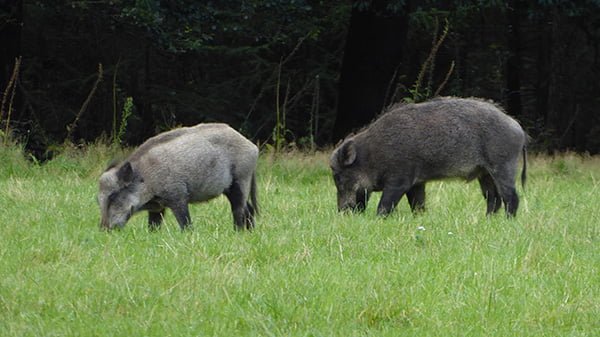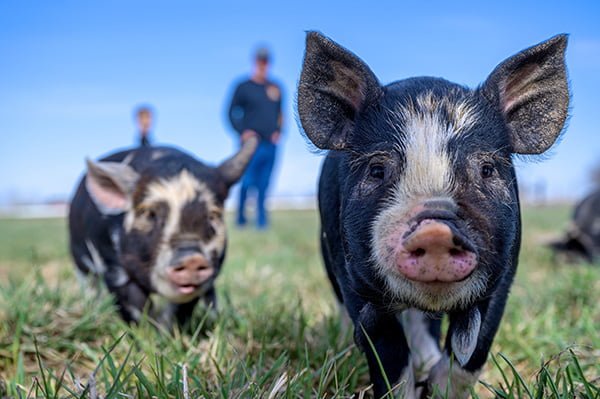Whether you have a pet pig, are looking to raise pigs, or are just curious about pigs, you may have some questions about what a pig eats. There are a lot of sayings and assumptions about what and how a pig eats. So you might think a pig will eat anything and as much of it as possible. But is that true? How does a domesticated pig's diet differ from a wild pig's diet? And do you feed butchering pigs the same as you feed farm pigs? What do pigs eat?
What to feed will depend on why you raise pigs, and the amount of pig food to feed depends on the animal's age, size, breed, and lifestyle. Below, we will share everything you need to know about feeding pigs.
Will Pigs Eat Anything?
It is often assumed that pigs will eat anything. Such phrases as "pigging out" and "eating like a pig" are often used as ways to describe excessive and indiscriminate eating habits. We assume pigs would eat anything and serve as a convenient way to get rid of our house scraps, leftovers, and waste food.
It may surprise you then to know that pigs can actually be quite picky eaters and will avoid eating spoiled, bad, or slimy food if given the option. They have food preferences, and indeed, for a pig to be healthy, it has certain nutritional needs that should be met. This is best acquired through a varied diet that will look different depending on whether the pig is wild, a meat pig, or a pet pig.
A pig's digestive system is quite simple and efficient, which allows them to eat a wide variety of plant and animal foods, including vegetation, roots, leaves, nuts, seeds, grass, flowers, mushrooms, insects, eggs, fish, and even small mammals. Pigs naturally eat a pretty varied and balanced diet. However, what is available to a wild pig is different from what is available to a domesticated pig. And how you feed a pig for fattening is under more strict regulation than what you feed a pig that is a pet.
What Wild Pigs Eat
Pigs are omnivores, and in the wild, pigs are foragers and will eat what they can find in whatever terrain or landscape they make their home in. Wild pigs use their sharp sense of smell to locate and eat plants, roots, leaves, grasses, grains, nuts, seeds, berries, mushrooms, tree bark, insects, insect larvae, eggs of other animals and birds, small reptiles, and amphibians such as snakes and frogs, and even small mammals like mice, rats, or rabbits.
Almost anything is an option, even dead carcasses. Of all pigs, wild pigs are perhaps the ones who actually live up to some of those common pig phrases and stereotypes. They will eat almost anything and can be quite voracious about it.

Source: Flickr
What Meat Pigs Eat
Domesticated pigs raised commercially to be meat, or butcher pigs are fed a specific diet meant to fatten them quickly and ensure that the meat is safe and uniform. There are more regulations in place for what to feed pigs raised for meat, and they are generally not fed as wide a variety of foods. Butchering pigs primarily have commercial feed grains and cereals, the most common cereals being soybean, barley, and wheat since these can fatten pigs quickly.
Some foods that a meat pig cannot be fed include salt, chocolate, moldy or spoiled food, fruit seeds or pits, raw cashews, acorns, meat, fish, eggs, dairy of any kind, alcohol, cabbage, mustard, broccoli roots or seeds, apple seeds, tomato leave or vines, potato leaves, stems, pr tubers, tree fruit leaves, scrap food, processed food, dead animals, or medications.
Some of these are foods that are generally not good for feeding pigs at all, and some are more about maintaining the integrity of the pig meat.
What Pet Pigs Eat
The food you can offer a pet pig has a great deal more variety to it. Unlike with commercial pigs, you can choose to offer a pig cheese, yogurt, meat, fish, and eggs, though sparingly. Pet pigs can eat insects and grasses and whatever else a pasture-raised pig might find if it forages. Pet pigs can be offered pelleted pig food or pig feed too. Acceptable vegetation you can offer your pig includes squashes, pumpkins, leafy greens, radishes, turnips, broccoli, and potatoes. Fruits can include melons, berries, apples, and bananas. Pigs may also enjoy flowers such as tulips. You can offer your pig unsalted nuts, oats, rice, unsalted seeds, and various kinds of grass and hay.
Pet pigs generally have a more balanced diet, and you can choose to use supplements to ensure your pig's nutrition is complete.

Source: Pexels
Feeding Piglet
Piglets will start out feeding on their mother's milk but can move on to eating solid food just after a week of being born. They can eat a mixture of feed as they grow, with the main bulk of their diet coming from corn and soybeans.
If you are raising baby pigs without a mother, you can feed them milk replacers such as goat's milk.
Foods Not to Feed Your Pig
Some foods you should never feed your pig include alcohol, sugar, salt, fruit tree leaves, fruit pits and seeds, processed food, dog food, cat food, spoiled food, moldy food, and unripe vegetation. There are also several wild plants that are toxic to pigs, so be sure to know what plants may grow in your area and might harm a pasture-raised pig. There is some debate as to whether a pig should ever eat meat or dairy. Some pig parents say never give your pigs meat, and others say it can be offered in moderation. What you decide is primarily a discussion best had with your vet, who can advise you on thesis particulars given your pig's species, size, age, and overall health. If ever you are unsure about the safety of some food source for your pig, wait until you can check with a professional before experimenting.
Always place your pig's food where it can stay dry, and remove any uneaten food before it spoils.
